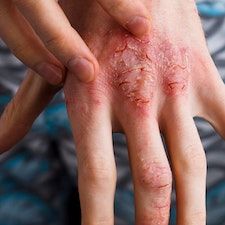Article
New Research Suggests Dupilumab Ineffective in Treating Head and Neck Area for Atopic Dermatitis
Author(s):
A new study from Denmark explored the ineffectiveness associated with dupilumab in certain regions of the body after long-term examination.

Dupilumab was not able to treat moderate-to-severe atopic dermatitis (AD) effectively in the head or neck region despite the fact that drug-survival over the course of 2 years was 86%, according to a Danish study.
Real-world studies have demonstrated shorter-term efficacy of dupilumab for AD patients, but the drug survival rates for the chronic inflammatory condition past 52 weeks have not been fully examined prior to this research.
The study was led by I. Vittrup, from the Department of Dermatology at Copenhagen University Hospital, Bispebjerg and Frederiksberg.
“We examined the short-and long-term safety, effectiveness, and drug survival of dupilumab treatment in a Danish nationwide cohort of patients with moderate-to-severe AD,” Vittrup and colleagues wrote. “The cohort is embedded in the prospective, multicenter Severe and ChRonic Atopic Dermatitis Treatment CoHort (SCRATCH) registry, including virtually all Danish patients treated with dupilumab for AD.”
Research and Methods
The investigators recruited 347 AD patients of adult age (about 60% male) for the first treatment of dupilumab, with the median Eczema Area and Severity Index (EASI) baseline score being 18.0 and the median baseline age being about 42 years.
They included all AD patients treated with dupilumab and included in the SCRATCH registry in Denmark from October of 2017 to March of 2022, with patients being enrolled in treatment for their condition at initiation and followed over the course of the study.
For every clinician meeting, both patients and clinicians reported Dermatology Life Quality Index (DLQI) ratings, AD localization, EASI scores, Patient-Oriented Eczema Measure (POEM) scores, Numerical Rating Scale (NRS) 72h mean pruritus, NRS 72h mean degree of sleep loss, and adverse events (AEs).
The investigators also assessed the effectiveness of dupilumab based upon localization of AD, using the proportion of study participants who reported AD in different body parts at both baseline and their follow-up visit.
Study Findings
The study’s results indicated that about 81% of the patients had been given a minumum treatment of 2 traditional systemic medications prior to dupilumab initiation.
They found that the most frequently reported anatomical regions with AD at baseline were the patients’ head-and-neck areas at 76% and their truncal areas at 72%.
The researchers noted that baseline EASI scores were found to be 18.0 (10.6 - 25.2), 6.5 (3.5 - 11.6) after 4 weeks, 3.7 (1.2 - 6.2) after 16 weeks, 2.0 (0.8 - 3.6) after 52 weeks, and 1.7 (0.8 - 3.8) after 104 weeks.
They also noted that while drug survival was high by 104 weeks, at a rate of 86%, the condition remained visibly present for most patients in the head and neck regions at high levels by that point as well, and 35% of patients reported any AE.
The most common AE reported by patients—25% in total—was conjunctivitis, with the median time for registration of the condition being 201 days .
“We report no new safety signals with prolonged dupilumab therapy and observed maintained treatment persistence over 104 weeks,” they wrote. “Importantly, however, dupilumab was unable to effectively treat AD in the head-and-neck.”
The study, “A nationwide 104 weeks real-world study of dupilumab in adults with atopic dermatitis: ineffectiveness in head-and-neck dermatitis,” was published in the Journal of the European Academy of Dermatology and Venereology.




